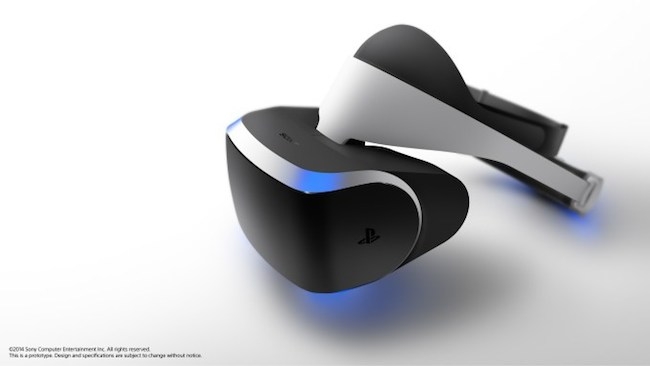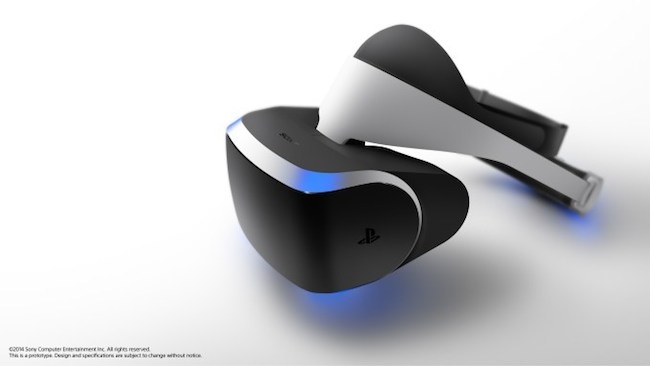
 Morpheus unveiled
Morpheus unveiled
In the wake of Facebook's $2bn swoop for Oculus Rift, last week's announcement that Sony is building a VR headset for the Playstation 4 seems a bit more significant. Are we about to see a domestic VR arms race? Or is AR (Augmented Reality) as epitomised by Google Glass the best way forward in the short term?
Sony's new headset, dubbed "Project Morpheus" in a not overly subtle nod towards The Matrix, has been in development since 2010 apparently and will be connected to the company's latest console by a 5m cable. It supports 1080p and features 100Hz motion detection, while tracking is handled by the same camera that governs the PS4 Move controllers. Those that have played with it out at the Game Developers Conference in San Francisco where Sony unveiled it say it's lightweight and comfortable to wear, probably as a result of being able to keep most of the processing grunt for it in a dedicated box sitting at the end of the cables.
There were some interesting little details from the games demoed on the unit too, such as the linking of a tablet into the gameplay so that VR immersion can become a social experience in 'meatspace' -- see, we can do the cyberpunk references too! -- as well as in the virtual realm.
The First Wave
Of course, with this it is making more than a nod to the first wave of VR technology that hit gaming arcades in the 1990s. Developed by W Industries, later Virtuality, these rather clunky units saw groups of players (if memory serves, up to four) linked together in either standing or sitting pods and playing a variety of fairly graphically basic games. While ground-breaking at the time the units were both expensive and took up a lot of space, and the arcade industry quickly realised it could make more money out of cheaper games with smaller footprints.
In many respects, the concept of VR was ahead of its time. Howard Rheingold had published his seminal tome 'Virtual Reality' in 1991, and this was in turn a decade after the first flowering of cyberpunk literature which initially sketched out the agenda and terminology for the technology. However, while the words talked enthusiastically of new virtual communities and whole existences moved online, this predated even the first transformative slow adoptions of the internet. It was science fiction in many respects: the equivalent of strapping two speakers to your head, lobbing a tapedeck into a rucksack and claiming you'd invented the Walkman.
Still Early Days?
It has to be said that, despite Facebook's purchase of Ocular Rift, it still seems a bit early for any form of mass market VR even in 2014. The Stereo 3D experience suggests that people are wary of immersive environments in the domestic space and headsets remain, well, headsets: clunky units however sleek their styling. Gamers are, of course, historically more happy to plug themselves in to such devices than the casual media consumer -- who are presumably Facebook's end game target market -- but ultimately you have to imagine that such devices need to be heading toward direct retinal projection for success.
That remains as much science fiction as science fact for now, but it is worth pointing out that while VR might be niche for a while yet, Augmented Reality (AR) is going to get its biggest boost ever when Google Glass finally hits the mass market. Can we view AR as a developmental step on the way towards VR? It might even be the other way round as AR more closely mirrors the way that the likes of Facebook et al are looking to work in the future by adding an online contextual social layer to real life.
Modern Capitalism Favours…
Excuse the first person, but personally I think AR is more liable to take off than VR too because of the way that modern capitalism works. You wear your 'specs' to walk down the street (scifi author David Brin calls them that and given his reputation for accurate near future predictions, it would be unwise to argue) and then firms can pay extra for their ads to appear in your vision, or you can likely pay even more to block them out. The sheer number of subscription services that could be launched on the back of such a technology is mind-boggling and encompasses everything from global Twitter overlays etc to micropayment services -- reviews of coffee shops in a small market town, directory of people in a street maintained by a couple of bored schoolkids (with added gossip gleaned from eavesdropping on their parents).
The Ocula Rift purchase made headlines, but comparing it to Facebook's $19bn purchase of Whatsapp puts it in context: it's still early days for VR and AR despite several decades of development and this remains a niche technology. But once Project Morpheus slips onto the shelves (hopefully in 2015) and after Google Glass finally gets a long overdue general release date (currently slipped to 'later this year') we may know more about how people will take to both of them.
Now, about Phil and Gladys in Number 24...
Tags: VR & AR


Comments